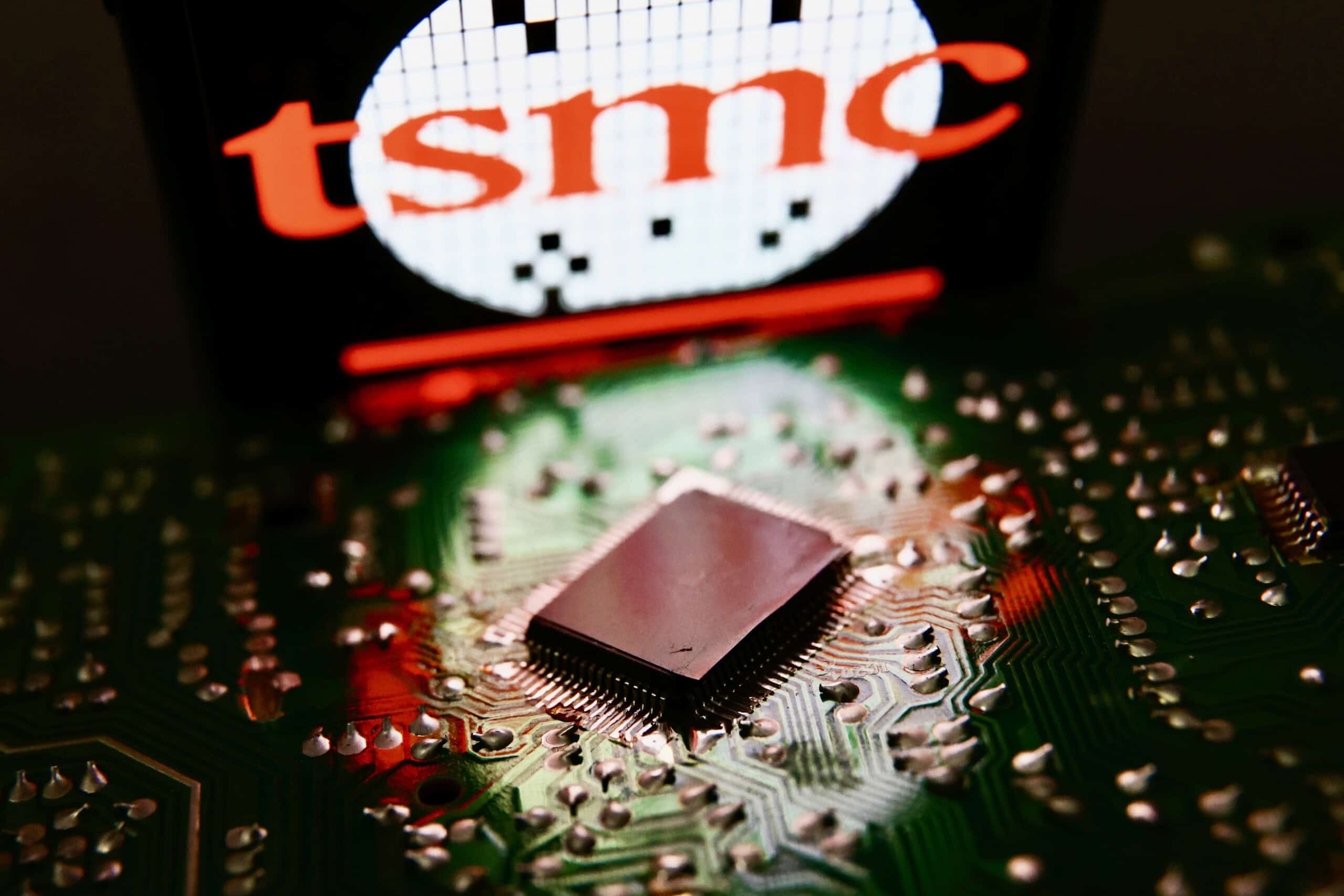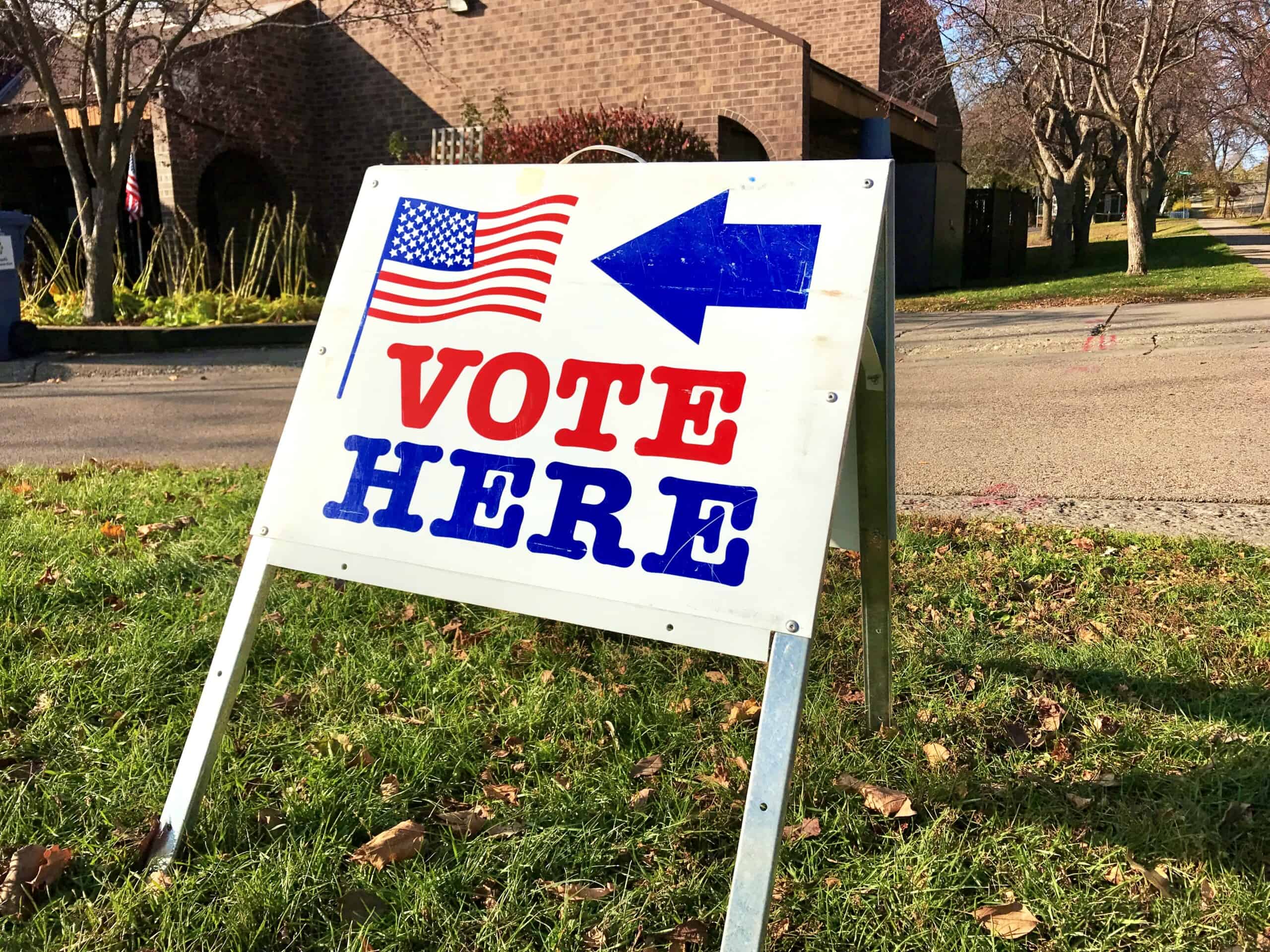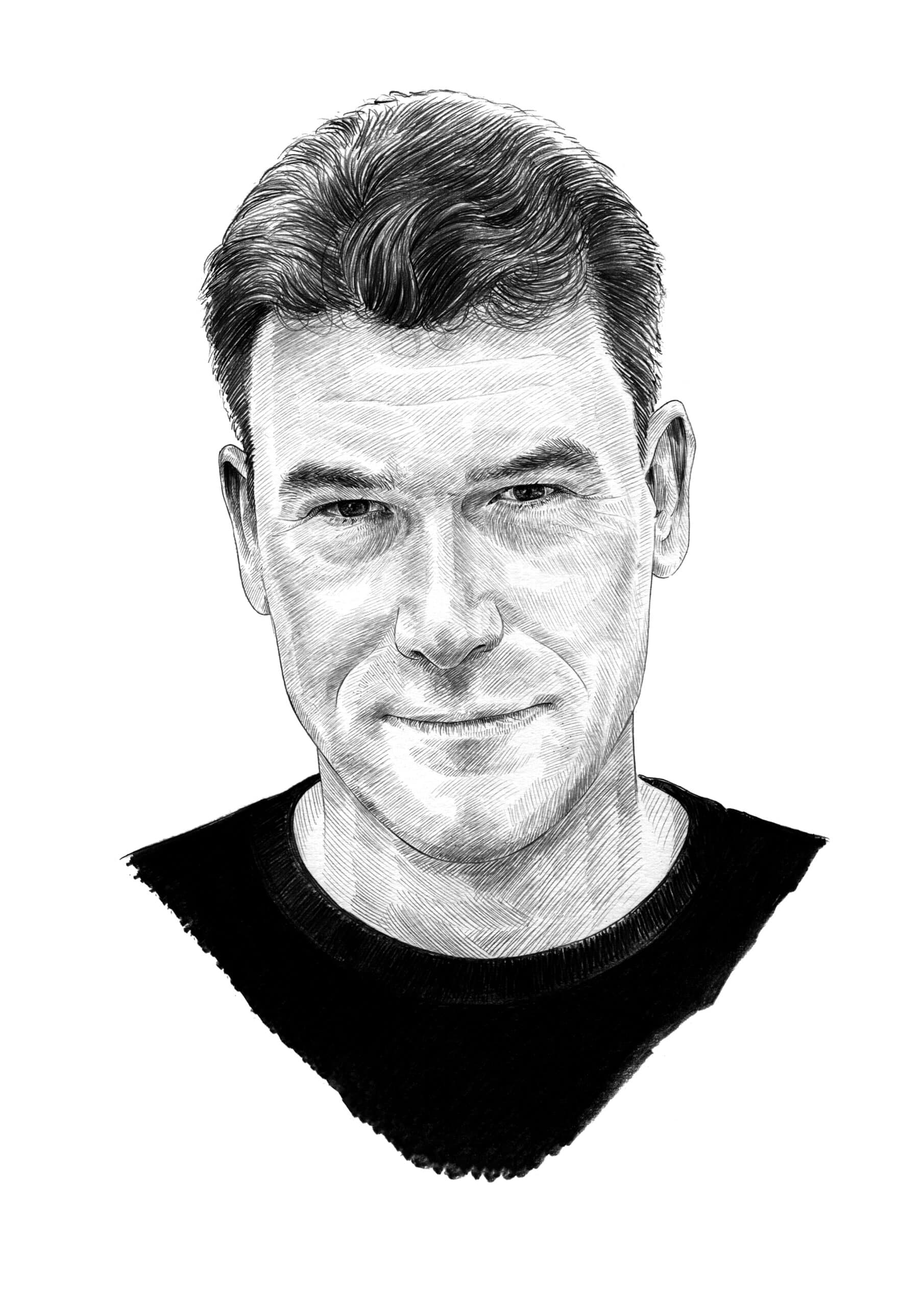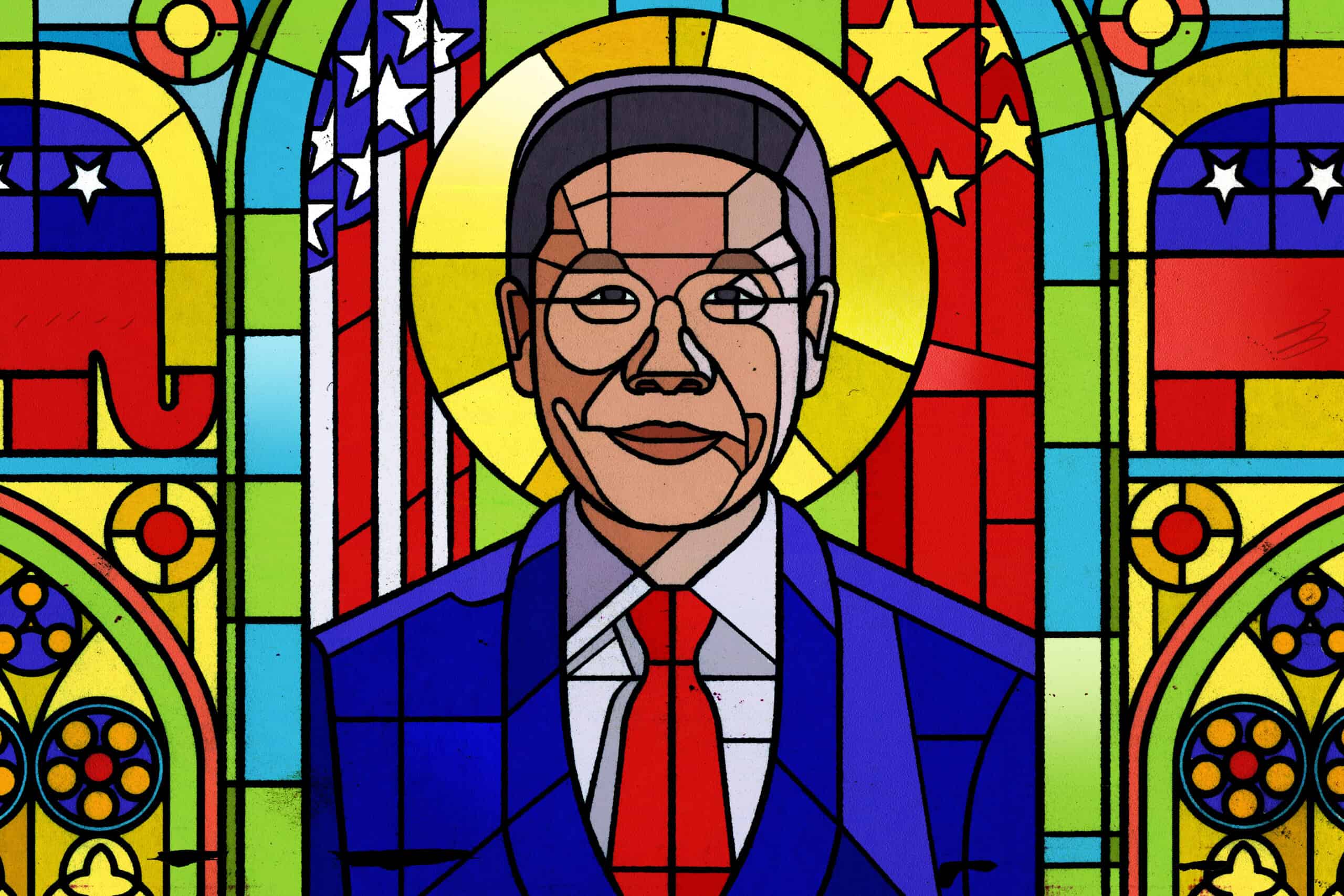
When Pastor Bob Fu traveled to Washington, D.C., in late January, he wasn’t expecting his life’s work to be validated. But at the National Prayer Breakfast — the most important annual event for politically-interested Christians — he found the assembled lawmakers and religious leaders less interested in topics of yesteryear, such as Roe vs. Wade or allowing churches to endorse political candidates, and more attuned to what he has been saying for more than two decades: The Chinese Communist Party (CCP) is immoral, and that the U.S. should, as he says, “hold the CCP accountable for every one of their evil acts.”
A former Tiananmen Square protester, Fu fled to the U.S. in 1997 after his underground protestant ministry in Beijing came under pressure by authorities. Ever since, Fu has advocated for religious freedom in China, and the 56-year old has become one of the most effective and well-connected human rights advocates operating between the U.S. and China.
But January’s prayer breakfast, he says, was the first time he really saw a “spiritual” shift in Washington’s approach to China.

“The opposite of communism is not capitalism. It is not democracy. It is faith in God,” Rep. Mike Gallagher (R-WI), former Chairman of the Select Committee on the Chinese Communist Party and one of the leading U.S. policy makers on China, said at the event. “Our long term ‘strategic competition’ with the Chinese Communist Party is not a test of different socio-economic systems. It is a struggle for souls.”
Fu’s Texas nonprofit, ChinaAid, is focused on winning this struggle for souls. He has helped facilitate escapes for dozens, if not hundreds, of Chinese dissidents, including high-profile cases like Chen Guangcheng, the “blind, barefoot” lawyer. Last year, Fu also played a pivotal role in helping dozens of members of the Shenzhen Holy Reformed Church, a Chinese congregation that was in exile in Thailand, resettle in Texas — the first time the U.S. has ever granted collective asylum to an entire church congregation.
But perhaps most importantly, Fu and ChinaAid have consistently peddled the message that the U.S. is locked in a righteous battle with China between freedom and bondage, authoritarianism and democracy, and good and evil. This message was relatively easy for U.S. officials to sidestep in the 2000s and 2010s, but a growing number of politicians and policy makers, especially republicans, are adopting Fu’s moralistic language.
In their recent Foreign Affairs piece, for instance, Gallagher and former deputy national security advisor Matthew Pottinger described the Chinese Communist Party’s strategy as “malevolent,” and former vice president Mike Pence said last September that he believed China’s leader, Xi Jinping, was an “evil man.” Former Secretary of State Mike Pompeo has blasted the CCP as an “atheist” regime that makes “godless” decisions. And even President Joe Biden has referred to leading Chinese officials as “bad folks” who are likely to do “bad things,” and declined to send representation to the Beijing 2022 Winter Olympics because of China’s religious persecution and human rights abuses.
“Ten or fifteen years ago, it would have been possible to say, ‘Hey, you’re being a bit alarmist,’” says Ian Johnson, senior fellow for China Studies at the Council on Foreign Relations. “But now, Christianity and other religious groups are really suffering quite a bit. Fu definitely has an agenda, which is to be as aggressive as possible in portraying the travails of Christians in China. But the CCP has also made Fu’s agenda kind of easy to push, because over the past ten years it’s gotten worse and worse.”

Indeed, the situation for protestants and other religious minorities has become dire since Xi Jinping came to power in 2012. The plight of the Uyghur population in Xinjiang is perhaps best known, but Chinese authorities have also demolished churches across the country, arrested thousands of protestant pastors and churchgoers, and have even attempted to ‘sinicize’ Christianity by changing sermons and replacing portraits of Jesus in churches with those of Xi Jinping.
Fu views these developments as China “entering into a new cultural revolution.” And yet, as a result, ChinaAid is prospering. In the past five years, the nonprofit’s budget, which derives almost entirely from donations, has more than doubled: Revenues rose from $1.6 million in 2018 to over $3.6 million in 2022.
“In a sense, we are one of these organizations working off Xi’s persecution,” Fu says.

Indeed, Fu credits ChinaAid’s recent successes to the broader shift against China among the American public: Last year, 83 percent of Americans said that China’s policies on human rights posed a problem to the U.S., according to a Pew Survey. The majority of Americans also believe that it is “more important to try to promote human rights in China, even if it harms economic relations with China.”

Lauren Turek, associate professor of history at Trinity University, says America’s moral turn against China is not entirely surprising when you remember how the Cold War with Russia was pitched. “It’s a Reagan-esque, ‘Evil Empire’ re-do,” she notes. “This kind of framing is not a commentary on the communist political system, but rather that these systems do not allow the countries to practice faith — that they do not have conscience.”
At minimum, I felt a spiritual obligation to speak up for those who were in prison in China — those brothers, sisters, and human rights lawyers — because they didn’t have a voice here.
Bob Fu
The U.S., of course, has tried for more nuanced engagement with China’s communist political system in the past, but it appears to be running out of patience. In fact, as the U.S. struggles to redefine its relationship with China, Fu’s own life story offers a kind of roadmap. Born into poverty, Fu says he was obsessed at a young age with making money — believing that money alone could solve his problems. As a college student, he then looked to politics and the promise of democracy in his quest for fulfillment. Dejected and hopeless when the Tiananmen Square protests ended in a massacre, he says, there was only one place left offering hope for change.

“In my third phase of searching,” he says, “I found that even if you export the U.S. Constitution and every Western political system or ideal, if the heart was still corrupted, it won’t change much. That was really the key turning point for my faith.”
Now, as Fu pushes his advocacy work further into partisan politics, he seems to be entering his fourth phase: the apocalyptic approach, prophesying doom if the U.S. fails to act. With a near-total embrace of Donald Trump, Fu is flush with cash and influence and has a renewed sense of urgency for his work.
“I want accountability,” he tells me, his typically bright eyes narrowing. “I want our government to be fully aware of what’s going on.”
PROTESTER TO PROTESTANT
With a wide smile, Bob Fu’s natural charisma has been winning over American audiences since 1997. In June of that year, Fu and his wife Heidi were living in Hong Kong after fleeing their home in Beijing several months before. Fu had been under constant surveillance and even spent two months in jail for his underground church activities, but the couple only decided to flee when Heidi got pregnant. In Hong Kong, Fu had tried to leverage his contacts with church leaders and American officials to get asylum, but the American consulate repeatedly told him that it would be impossible.
Peter Jennings closes out an episode of ABC’s World News Tonight covering the Hong Kong handover, June 30, 1997. Credit: Shatner Method via YouTube
Then came divine intervention.
Peter Jennings, host of ABC’s World News Tonight program, was in Hong Kong to cover Britain’s upcoming handover of the city to Beijing. Jennings heard about Fu’s story and arranged to meet him in a local McDonald’s. There, Fu told Jennings — and his camera crew — that he was a Christian dissident and was afraid of what might happen to him once Beijing took control of the city.
“The countdown to the handover is a countdown to our imprisonment,” Fu told Jennings.
After the segment aired to a national audience, President Bill Clinton received a flurry of letters from Americans advocating on Fu’s behalf. On June 27, 1997, just five days before British authorities handed Hong Kong to Beijing, the Clinton administration granted asylum to Fu and his wife, and the couple flew to the United States.
At the time, Fu didn’t fully understand the bureaucratic, political and public relations machinations that facilitated his resettlement. “I didn’t even know the word for advocacy,” he says now. But the rapid results intrigued him, especially as he realized the unique position he suddenly found himself in. Fu’s church contacts back home started reaching out for guidance and help at the same time that American government officials were calling him up and expressing an interest in learning about Christian repression in China.
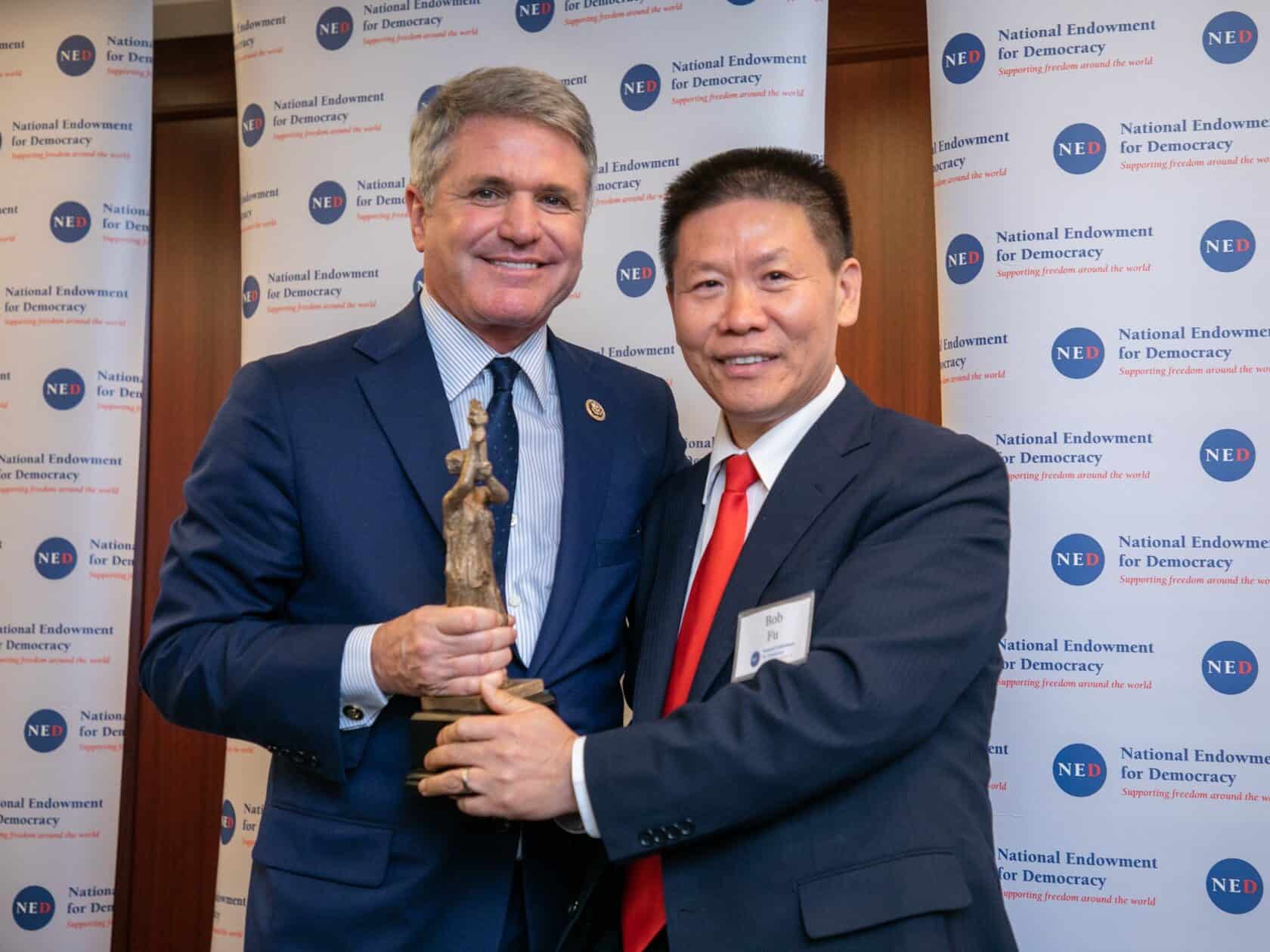
Having enrolled in graduate school at Westminster Theological Seminary, a protestant college on the outskirts of Philadelphia, Fu had planned to fully devote himself to religious studies. But after Chinese authorities sentenced two church leaders to death around Christmas Day in 2001, Fu founded ChinaAid to raise awareness.
“At minimum, I felt a spiritual obligation to speak up for those who were in prison in China — those brothers, sisters, and human rights lawyers — because they didn’t have a voice here,” he says. “Tibetan organizations had the Dalai Lama; they had Richard Gere. But nobody was hearing our leaders at that time.”
Fu’s desire to help those less fortunate than himself stems from his own difficult childhood. He was born in 1968 in rural Shandong province to a mother who was a beggar and a disabled father.
“Our family was always bullied. In high school, I thought poverty was the problem, so I wanted to become a millionaire,” says Fu, whose Chinese name is Fu Xiqiu (傅希秋). “In my college years, I found that maybe money was not the core issue to solve. The problem was the political system.”

While studying English literature at Liaocheng Teacher’s College (now called Liaocheng University) in Liaocheng, Shandong, Fu was inspired by Michael Gorbachev and the political reforms of the Soviet Union. He believed that the Chinese Communist Party may be primed for similar democratic reforms, and when pro-democracy protests broke out in Tiananmen Square in the spring of 1989, it felt like the moment Fu was waiting for. He led a group of students from his college to Beijing to join the protests.
Fortunately for Fu, he was not in the square on June 4, the day of the massacre, but after returning to school, Fu was so despondent he that he thought about making a suicide bomb.
“I wanted to see a China with more political accountability, transparency and political reform. Then the CCP and their machine guns and tanks broke everything,” he says. “I had to take a much deeper look at my own life.”
Fu turned to religion after an American English teacher at his college gave him a smuggled biography of Xi Shengmo, a 19th century Chinese convert to Christianity. Fu was hooked and converted himself after finishing the book. He then began to spread what he learned to other students and quietly organized small bible study groups on campus.

Fu wasn’t alone in turning to religion following the Tiananmen Square protests. Fenggang Yang, founding Director of the Center on Religion and the Global East at Purdue University, notes that at least four of the 21 people on Beijing’s most-wanted list of student leaders later converted to Christianity as did countless other protesters and second-tier leaders like Fu. (Many others across China flocked to the Falun Gong, a belief system that emerged from China’s spiritual vacuum in 1992 and soared in popularity.)
“Bob Fu was part of the generation of people who had been through this political trauma, and then searched inward for answers,” says Johnson. “The political realm was off limits, so people essentially went into the spiritual, which is harder for the state to control. ‘I can’t influence society, but I can influence myself,’ the thinking went. ‘And maybe I can influence my church.’”
Fu began operating an underground protestant church from his dorm room even as he took a job in 1993 teaching English at the Central Party School of the Chinese Communist Party, one of the main training grounds for Chinese government cadres. The irony of hosting an illegal church while training cadres that could one day bust him is not lost on Fu, who titled his autobiography God’s Double Agent.
Protestantism is one of five official state religions in China, but the vast majority of worshippers practice outside of state-sanctioned institutions in underground or unregistered congregations. Such churches could be as small as a few people meeting in someone’s living room, and unregistered house churches flourished and spread across the country in the 1990s and 2000s. Christianity became the fastest growing religion in China, growing by 10 percent each year from 1980 to 2010, estimates Yang.
“By the late 1990s, there was this widespread questioning about what we did in 1989,” remembers Fengsuo Zhou, a former student leader at the Tiananmen square protests and president of Humanitarian China, who also converted around this time. “This was probably the lowest point for our generation, because China was joining the World Trade Organization, but we still had this deep trauma.”
Even though authorities were likely aware of these unregistered churches, the sheer number made it too difficult for police to fully contain them. Carsten Vala, Chinese politics professor at Loyola University Maryland, says many were allowed to continue practicing so long as they didn’t cross a set of unofficial red lines: “Don’t connect with foreigners, don’t develop organizations across borders, and don’t develop huge groups that are acting in visible ways,” he says.

Fu believes that his congregation started to come under scrutiny after he started a bible training school in the Beijing suburbs. He and his wife were detained in May 1996, and spent nearly two months in jail. Heidi got pregnant shortly after their release that July, which is when the couple decided it was time to flee.
FUELING HOPE
Fu couldn’t have chosen a better place than Midland, Texas, for his fledgling NGO. Fu was still living in Philadelphia and just visiting his friend’s church in Midland when he decided almost immediately to move his family. He found the Christian community there extremely welcoming and engaged in human rights issues — and he also found deep pockets.
He is the only one of us dissidents who has successfully developed this deep community to support human rights work for China from the American Christian community.
Fengsuo Zhou, a former student leader at the Tiananmen square protests and president of Humanitarian China
A largely suburban and unassuming city of 140,000 people in west Texas, Midland is by some metrics, the wealthiest city in America, thanks to its prime location in the heart of the oil-rich Midland Basin, a region that accounts for roughly 15 percent of the U.S.’s annual crude oil production.
“These people are so generous,” Fu says of the many wealthy oil executives that support ChinaAid in Midland. “They will just hand you a check for $100,000 on New Year’s Day. They know you’re doing the Lord’s work.”

Fu pays himself a modest salary — roughly $90,000 per year as of the latest filings, which is up from $58,000 in 2013 when ChinaAid first reported — and uses the vast majority of ChinaAid’s donations to pay for legal services for Chinese dissidents like Gao Zhisheng and to facilitate the testimonies of Chinese human rights lawyers in front of Congress.
In so doing, he has proven just how dangerous religious groups can be for the Chinese Communist Party.
Terry Halliday, research professor emeritus at the American Bar Foundation, argues that, in many ways, the unofficial Protestant churches in China are the country’s largest civil society group. Many of China’s human rights lawyers, for instance, are drawn to the church because of “a strong interest in classic Christian values — equality, human dignity, justice, love — that they feel are absent from China’s legal system.”

Meanwhile, organizations like ChinaAid give these human rights lawyers an international reach, “which is unlike almost any other civil society organization in China and must be very concerning to the Party,” says Halliday. “It is a very powerful symbolic statement that Christians inside China can get international support from Christians outside China.”
Especially when that international support comes from the president of the United States.
Another of Midland’s advantages is that George W. Bush spent part of his childhood there and still had contacts in the city as Fu was building up ChinaAid. Bush invited Fu and four other activists to the White House to discuss human rights issues in China just weeks before the Beijing Olympics were set to take place in 2008.
“Not by accident, we scheduled the meeting the same day the Chinese foreign minister was in town,” Bush writes about Fu.
It is a testament to Fu’s charm that the two men have remained friends since. In 2021, Bush even painted a portrait of Fu and profiled him for his book on the experiences of American immigrants.


Left: Bob Fu presents then President George W. Bush and Mrs. Bush with hand-copied bible pages from Chinese Prisoners. November 1, 2011. Right: Bob Fu’s portrait and profile included in George W. Bush’s book, Out of Many, One. Credit: George W. Bush via Facebook, @BNMidland via X
With the Bush connection under his belt, Fu went on to make impressive inroads in the GOP throughout the 2000s and 2010s. ChinaAid’s advisory board includes Frank Wolf, a 34-year former Republican congressman from Virginia; Scott Flipse, the director of communications and policy at the Congressional-Executive Commission on China; and William Inboden, a former senior director on the National Security Council during Bush’s administration.

Fu has also worked with Democrats, however — sometimes to spectacular effect. In 2012, he made international headlines when he helped facilitate the escape of the blind human rights lawyer Chen Guangcheng. Chen had worked on human rights issues, including land rights and forced abortions, before he was put under house arrest for almost seven years by Chinese authorities in the mid 2000s. Fu helped circulate a video and letter showing the state of Chen’s confinement, and in May of 2012, after Chen’s daring escape to the U.S. embassy in Beijing, Chen called Fu’s cell phone in order to testify about his situation to the U.S. Congress.
The Chinese dissident community is notoriously fractured and riddled with scandals. Fu went on to become a trusted advisor to Chen as he took on a role as a visiting scholar at New York University, but Fu was also briefly accused of installing spyware on Chen’s iPad. Fu sorted out the ordeal and patched things up — he and Chen remain good friends — but it wasn’t long before another dissident accused him of playing foul.
In 2020, China’s most provocative dissident, Guo Wengui, said Fu was a Chinese spy, causing Guo’s many followers to protest outside Fu’s home. Fu again emerged relatively unscathed from the skirmish, in large part because of his impressive network of wealthy and politically influential Christians in the United States.
Bob Fu speaks during the Select Committee on the Chinese Communist Party’s interfaith roundtable on the ‘CCP’s Threat to Religious Freedom’, July 12, 2023. Credit: The Select Committee on the CCP
When protesters encircled Fu’s house, for instance, Texas senator Ted Cruz tweeted that it was “shameful,” and that “Bob is a fearless voice for human rights in China & Xi and the other despots fear him.” Rep. Chris Smith (R-NJ) also released a statement saying, “I unequivocally attest to Pastor Fu’s impeccable character, integrity, kindness and bravery.”
Zhou, the former Tiananmen Square protester, notes that Fu “stands out in the activist community” because of these connections. “He is the only one of us dissidents who has successfully developed this deep community to support human rights work for China from the American Christian community,” says Zhou.
Yaxue Cao, director of China Change, a website that tracks human rights issues in China, agrees. “Everybody knows him,” he says. “He has a wide range of connections, and he’s very keen to cultivate these political figures on Capitol Hill and in the White House and State Department.”

These days, however, Fu seems most keen to cultivate his connection with Trump, whom Fu says is the only person strong enough to stand up to Xi Jinping’s repressive tactics.
PROTESTANT TO PARANOID?
Fu’s support for Trump has been near absolute. In 2020, Fu posted that he was proud to attend Trump’s Jan. 6 rally that resulted in the crowd storming the Capitol. Since then, he has consistently downplayed Trump’s role in the Jan. 6 riots and posted in support of Trump in his criminal trials.
“In my personal view, Trump did the best,” he says. “My many friends inside the government, even in China, kept telling me that Trump was the first U.S. president to make the Communist Party really afraid.”
It is not an uncommon story among Chinese dissidents in the U.S.; Fu’s friend Chen Guangcheng, for example, fully supports Trump and the MAGA movement despite becoming a global symbol for democratic ideals.

“A large percentage of Chinese dissidents view Trump as more on the right side than the Democrats,” says Johnson. “They see Trump as being tough on the CCP, so they like Trump. It’s as simple as that.”
Fu has worked closely with President Joe Biden’s administration on cases like the Shenzhen Holy Reformed Church, but his personal values follow a familiar pattern for a Texas conservative, albeit with a CCP-focused twist. On the border crisis, for instance, Fu says he is concerned about “weaponized migration” and hones in on the surge of Chinese migrants who crossed the border last year.
“From spy balloons to buying thousands of acres of land next to military bases, there’s already an invasion happening,” he says. “Around 35,000 Chinese military-age people were detained at the border in 2023. Because of political repression, they may qualify for asylum. But these people, you need some background check; you need to know, where did they come from? Are they Communist Party members?”
A large percentage of Chinese dissidents view Trump as more on the right side than the Democrats. They see Trump as being tough on the CCP, so they like Trump. It’s as simple as that.
Ian Johnson, senior fellow for China Studies at the Council on Foreign Relations
Fu’s paranoia echoes Trump’s own. When asked earlier this month why he thought Chinese migrants were crossing the border, Trump noted that “they’re very healthy young men for the most part,” and “they’re probably building an army from within.”
Gregorio Bettiza, a senior lecturer in international relations at the University of Exeter, notes that this kind of reaction is reminiscent of the U.S.’s Islamophobia and represents a potentially dangerous shift in the U.S.’s approach to China.
“It’s a framing that emerges when things are seen as a struggle between faith and religious freedom and godlessness and atheism,” he says. “It’s a ‘clash of civilizations’ framing.”
Some observers note that this kind of framework and Fu’s willingness to wade further into U.S. politics threatens to undermine his advocacy work. “Support for human rights in China is much wider than right-wing republicans associated with Trump,” notes Halliday.
But it is also the framework that Fu has been agitating for for more than 20 years. As he testified to Congress in 2013, the CCP’s “wickedness” is only partly to blame for its human rights violations. Also at fault is the U.S. for losing some of its “God-given, self-evident fundamental ideals and principles.”
Finally, thanks to some bizarre alchemy of Donald Trump, deteriorating U.S.-China relations, and evangelical oilmen from Texas, the gospel according to Bob Fu seems to be spreading.
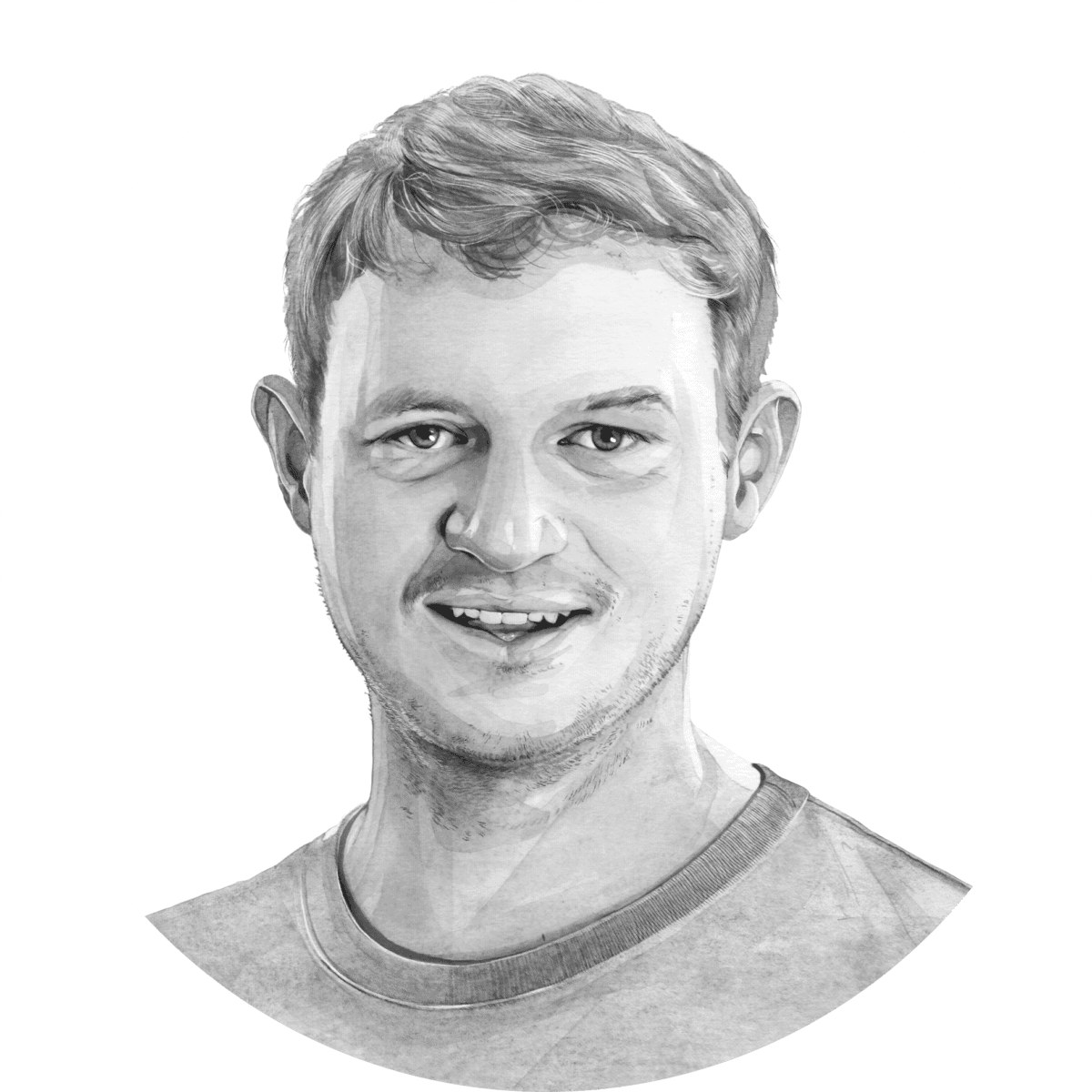
Grady McGregor is a freelance writer for The Wire China based in Washington, D.C. He was previously a staff writer at Fortune Magazine in Hong Kong, writing features on business, tech, and all things related to China. Before that, he had stints as a journalist and editor in Jordan, Lebanon, and North Dakota. @GradyMcGregor


